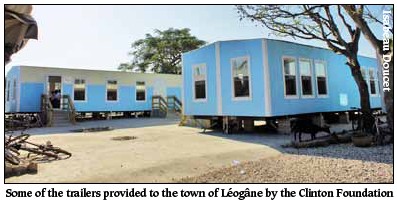|

The
Clinton Foundation has made public the results of its inspection
of 20 trailers designed to be used as hurricane shelters and
classrooms in Haiti, after a Nation magazine
investigation found high levels of formaldehyde in one unit as
well as problems including mold, leaking, shoddy construction,
lack of sanitation and poor ventilation in others.
While the foundation has backed off previous claims
that the shelters built in the
southern town of
Léogâne are “hurricane
proof,” they maintain that the 20 trailers, built in the
U.S. by Clayton Homes and funded to the tune of $1 million by
the foundation, are “safely designed and structurally sound
for their intended purpose.”
However, the Léogâne mayor’s office maintains that they are
unfit as emergency hurricane shelters or classrooms. Léogâne
civil protections officer, Philippe Joseph, says that without
adequate sanitation facilities, he will not approve the
shelters’ use in times of emergency, adding “there needs to
be electricity to permit ventilation; there must be water and
latrines; this is the minimum for us to be able to use these
whether as emergency shelters or as schools.”
The Clinton
Foundation report, which contains four recommendations from
structural engineer Liam O'Hanlon who assessed the units, does
not address the issues of water, latrines or electricity.
O’Hanlon reported moisture in the units but no mold or leaking,
although he had access to the interiors of only four of the 20
shelters.
He
noted that storm shutters are “key” to the shelters’
capacity to resist “debris, projectiles, or failure of the
building envelope.” He “did not see any evidence of the
shutters at any of the sites.”
O'Hanlon
recommended installing storm shutters and improving ventilation,
as well as routine maintenance to fix damage from leaks and
tighten loose anchoring straps.
The Clinton
Foundation declined to comment on the whereabouts of the storm
shutters, or on its plans for implementing the engineer’s
recommendations, and did not respond to repeated requests for an
interview.
According to
O'Hanlon, Clayton Homes shipped the storm shutters. However, in
Léogâne, local officials say they have yet to receive them, and
they were not informed of the foundation’s inspection of the
shelters in July. They have also not received the report, which
is only available in English.
That
inspection included air tests by the engineering consultants NTA
Inc. When the trailers are unventilated, NTA found levels of the
carcinogen formaldehyde – to which children are particularly
vulnerable – rise to 109 parts per billion (ppb), which is above
the rate at which adverse effects have been documented in
sensitive populations.
The
foundation defends these levels, citing 750 ppb as a “permissible
exposure limit” in industrial settings. Peggy Jenkins, a
California Air Resources Board official specializing in
classroom air quality, says this standard is “really not the
appropriate yardstick,” because it was “established for
healthy adults, as opposed to growing children.”
Jenkins says “they should have ventilation,” adding the
heat of the classrooms, where NTA recorded some temperatures of
over 98.6 degrees, is also “really unacceptable.”
She
added that the moisture the engineer reported in some trailers
was also cause for concern, predicting “You will have mold in
there very quickly.”
Jenkins does not think it would be possible to establish whether
there was a mold problem by looking through windows as O'Hanlon
had done. "Many mold problems are hidden,” she said. “You
really do need to go in and do an inspection."
Reached by telephone, O'Hanlon, who was accompanied on the
inspection by an architect working with the Clinton Foundation,
explained that he had not entered most of the shelters because "They
didn’t have keys to all of them, but they’re all the same."
He added: “So there wasn’t anything to see."
The
engineer, who said he "had to sign a privacy agreement with"
the Clinton Foundation, declined to answer questions about the
shelters' present safety, given the absence of storm shutters
observed in his report.
André Hercule, St. Thérèse de Darbonne’s school director, told
Haïti Liberté that the trailers “are in a very bad state”
and will soon be moved off the school property to make way for
planned construction of a new "earthquake and
cyclone-resistant” building.
Philippe Joseph insists that many of the problems
could have been avoided by simply consulting with the mayor’s
office, adding “the biggest problem is that the funds meant
to rebuild
Haiti are used by the Clinton Foundation to make a project to
promote the Clinton Foundation but that cannot serve the
population.” |